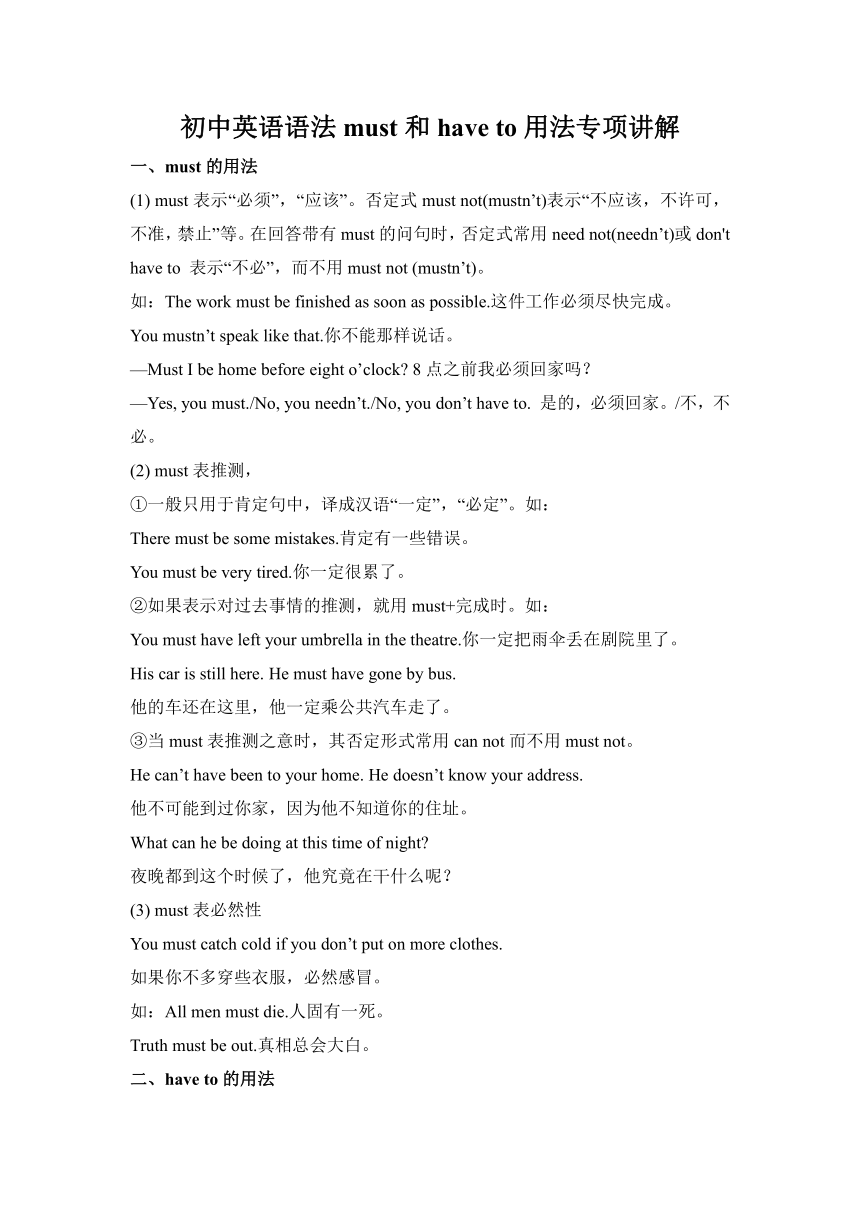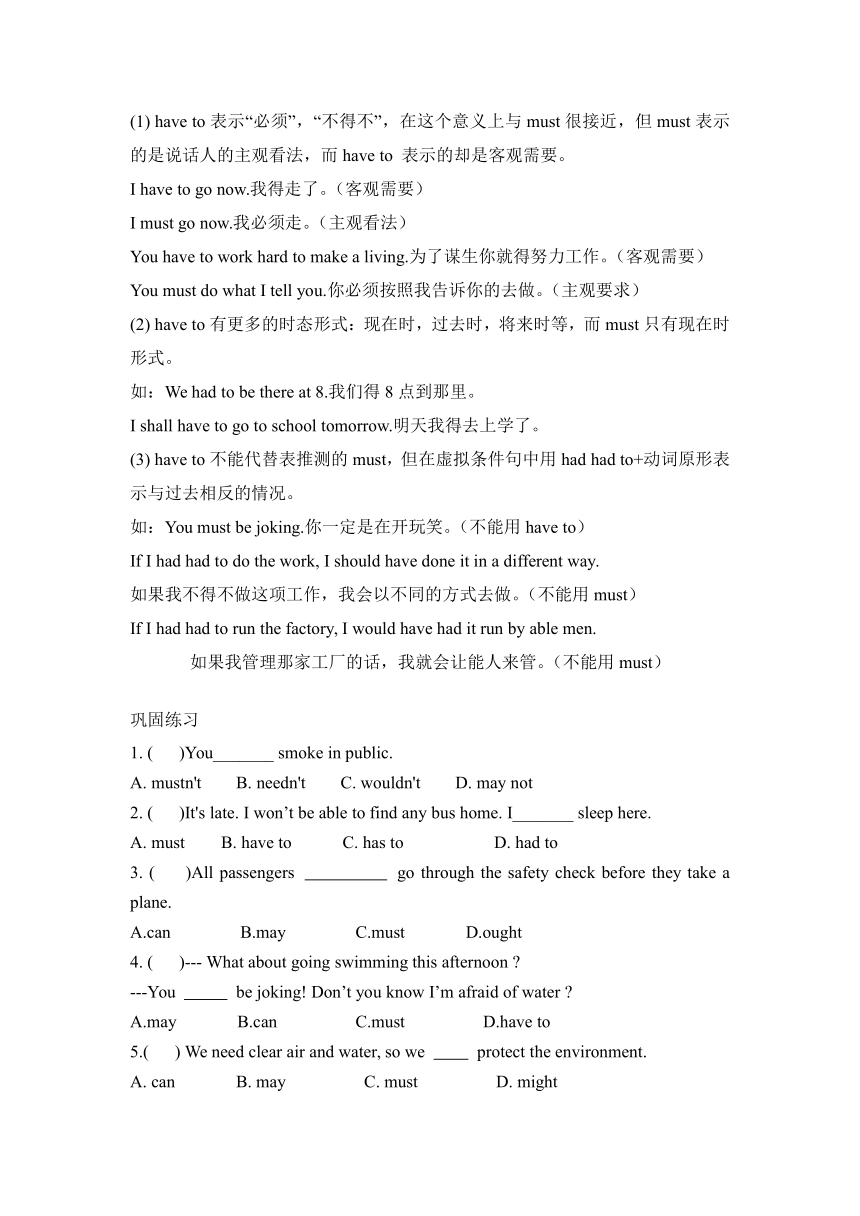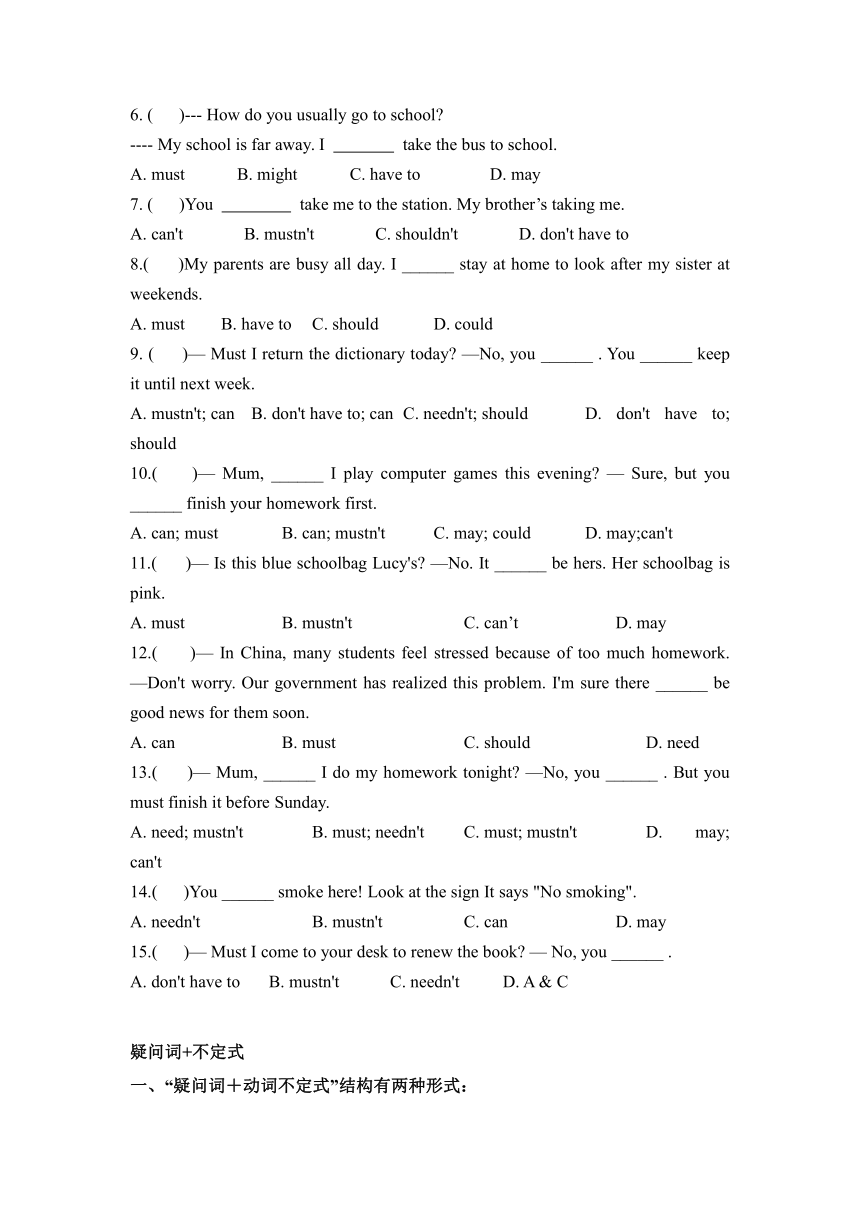初中英语语法must和have to用法专项讲解
文档属性
| 名称 | 初中英语语法must和have to用法专项讲解 |  | |
| 格式 | doc | ||
| 文件大小 | 52.0KB | ||
| 资源类型 | 教案 | ||
| 版本资源 | 牛津译林版 | ||
| 科目 | 英语 | ||
| 更新时间 | 2021-05-01 19:46:11 | ||
图片预览



文档简介
初中英语语法must和have to用法专项讲解
一、must的用法
(1) must表示“必须”,“应该”。否定式must not(mustn’t)表示“不应该,不许可,不准,禁止”等。在回答带有must的问句时,否定式常用need not(needn’t)或don't have to 表示“不必”,而不用must not (mustn’t)。
如:The work must be finished as soon as possible.这件工作必须尽快完成。
You mustn’t speak like that.你不能那样说话。
—Must I be home before eight o’clock? 8点之前我必须回家吗?
—Yes, you must./No, you needn’t./No, you don’t have to. 是的,必须回家。/不,不必。
(2) must表推测,
①一般只用于肯定句中,译成汉语“一定”,“必定”。如:
There must be some mistakes.肯定有一些错误。
You must be very tired.你一定很累了。
②如果表示对过去事情的推测,就用must+完成时。如:
You must have left your umbrella in the theatre.你一定把雨伞丢在剧院里了。
His car is still here. He must have gone by bus.
他的车还在这里,他一定乘公共汽车走了。
③当must表推测之意时,其否定形式常用can not而不用must not。
He can’t have been to your home. He doesn’t know your address.
他不可能到过你家,因为他不知道你的住址。
What can he be doing at this time of night?
夜晚都到这个时候了,他究竟在干什么呢?
(3) must表必然性
You must catch cold if you don’t put on more clothes.
如果你不多穿些衣服,必然感冒。
如:All men must die.人固有一死。
Truth must be out.真相总会大白。
二、have to的用法
(1) have to表示“必须”,“不得不”,在这个意义上与must很接近,但must表示的是说话人的主观看法,而have to 表示的却是客观需要。
I have to go now.我得走了。(客观需要)
I must go now.我必须走。(主观看法)
You have to work hard to make a living.为了谋生你就得努力工作。(客观需要)
You must do what I tell you.你必须按照我告诉你的去做。(主观要求)
(2) have to有更多的时态形式:现在时,过去时,将来时等,而must只有现在时形式。
如:We had to be there at 8.我们得8点到那里。
I shall have to go to school tomorrow.明天我得去上学了。
(3) have to不能代替表推测的must,但在虚拟条件句中用had had to+动词原形表示与过去相反的情况。
如:You must be joking.你一定是在开玩笑。(不能用have to)
If I had had to do the work, I should have done it in a different way.
如果我不得不做这项工作,我会以不同的方式去做。(不能用must)
If I had had to run the factory, I would have had it run by able men.
如果我管理那家工厂的话,我就会让能人来管。(不能用must)
巩固练习
1. ( )You_______ smoke in public.
A. mustn't B. needn't C. wouldn't D. may not
2. ( )It's late. I won抰 be able to find any bus home. I_______ sleep here.
A. must B. have to C. has to D. had to
3. ( )All passengers go through the safety check before they take a plane.
A.can B.may C.must D.ought
4. ( )--- What about going swimming this afternoon ?
---You be joking! Don抰 you know I抦 afraid of water ?
A.may B.can C.must D.have to
5.( ) We need clear air and water, so we protect the environment.
A. can B. may C. must D. might
6. ( )--- How do you usually go to school?
---- My school is far away. I take the bus to school.
A. must B. might C. have to D. may
7. ( )You take me to the station. My brother抯 taking me.
A. can't B. mustn't C. shouldn't D. don't have to
8.( )My parents are busy all day. I ______ stay at home to look after my sister at weekends.
A. must B. have to C. should D. could
9. ( ) Must I return the dictionary today? 桸o, you ______ . You ______ keep it until next week.
A. mustn't; can B. don't have to; can C. needn't; should D. don't have to; should
10.( ) Mum, ______ I play computer games this evening? Sure, but you ______ finish your homework first.
A. can; must B. can; mustn't C. may; could D. may;can't
11.( ) Is this blue schoolbag Lucy's? 桸o. It ______ be hers. Her schoolbag is pink.
A. must B. mustn't C. can抰 D. may
12.( ) In China, many students feel stressed because of too much homework. 桪on't worry. Our government has realized this problem. I'm sure there ______ be good news for them soon.
A. can B. must C. should D. need
13.( ) Mum, ______ I do my homework tonight? 桸o, you ______ . But you must finish it before Sunday.
A. need; mustn't B. must; needn't C. must; mustn't D. may; can't
14.( )You ______ smoke here! Look at the sign It says "No smoking".
A. needn't B. mustn't C. can D. may
15.( ) Must I come to your desk to renew the book? No, you ______ .
A. don't have to B. mustn't C. needn't D. A & C
疑问词+不定式
一、“疑问词+动词不定式”结构有两种形式:
疑问词+to+动词原形
如:I don’t know what to say. 我不知道说什么。
Can you tell me how to make a paper boat? 你能告诉我怎样做一只纸船吗?
疑问词+名词+to+动词原形
如:I don’t know which topic to choose. 我不知道选哪个题目。
二、“疑问词+动词不定式”结构中的疑问词,包括疑问代词who, what, which和疑问副词how, when, where等。这些疑问词和不定式一起构成了不定式短语,这种结构可在句子中作以下成分:
主语:
如:Where to stay for the night is a problem. 晚上在哪儿过夜还是个问题。
宾语:
We must know how to operate the machine. 我们必须弄懂如何操作这机器。
In one of his books, Marx gave some advice on how to learn a foreign language.在马克思的一本书中,他对如何学习一门外语提出了一些建议。(作介词on的宾语)3. 表语:
如:The question is which to choose. 问题是选哪个。
同位语:
如:The problem what to send them is unknown. 送什么给他们这个问题还不知道。
三、“疑问词+动词不定式”作宾语时,相当于一个由该疑问词引导的宾语从句。例如:Excuse me. Can you tell me how to get to the bookshop?= Excuse me. Can you tell me how I can get to the bookshop?
四、“疑问词+动词不定式”结构,经常放在tell, show, teach, learn, know, wonder, discuss, remember, forget, find out等动词(词组)之后作宾语。如:
The teacher told the students how to do the experiment.
老师教学生如何做实验。(句中told含有taught的意思)
The young woman doesn’t know what to do.
那位年轻女子不知道怎么办。(句中what不能改换成how)
He tells me how to answer all the questions in English.
他告诉我怎样用英语回答所有的问题。(句中的how不能省去)
五、如何表达“怎么办”,在翻译“怎么办”时,许多同学译成how to do,实际上是犯了汉语式英语的错误,“怎么办”的实际意义是“做些什么”,故应用代词what作动词do的宾语,而不用副词how。只有在表达“怎样做这件事”时才说how to do it。
巩固练习
1.( ) I am going camping this Saturday. I’ll call Tom to make sure________.
A. which to start B. what to start C. who to start D. when to start
2. ( )In the past the poor didn’t have warm houses________.
A. to live in it B. to live in C. living in D. to live in them
3. ( )We have two rooms________, but I can’t decide________.
A. to live; to choose which one B. lived; choose which one
C. to live in; which one to choose D. live; which one
4. ( )-There are many hair clips for you to________.
-But I don’t know________to buy.
A. choose; what B. choose; which
C. choose from; which D. choose from; what
5. ( )-Mr Wu has recommended many books. Have you decided________first?
-Yes. The Little Prince.
A. how to read B. which to read C. when to read D. where to read
6. ( )Elsa doesn't know ______ about her worries.
A. who to talk B where to talk to C. who to talk to D. how to talk
7. ( )There are ______ interesting books in our library that I don't know first.
A so many; what to read B. so much; which to read
C. so many; which to read D. so much; what to read
8. ( )I'm going on a field trip but I haven't decided ______ .
A. what to do B. to do what C. where to go D. to go where
9.( ) The computer doesn't work well. I don't know ______ .
A. how to do B. what to do it C. how I can do D. what to do
10.( ) — I'm not sure ______ to do with my problem. — Why not ask your English teacher for help?
A. when B. what C. how D. which
11.( ) If you don't know ______ , please come to me.
A. who to talk B. what to talk with C. who to talk to D. what to talk
12.( ) The books on the Internet are very cheap, but Jack doesn't know ______ them.
A. where to buy B. what to buy C. how to buy D. when to buy
一、must的用法
(1) must表示“必须”,“应该”。否定式must not(mustn’t)表示“不应该,不许可,不准,禁止”等。在回答带有must的问句时,否定式常用need not(needn’t)或don't have to 表示“不必”,而不用must not (mustn’t)。
如:The work must be finished as soon as possible.这件工作必须尽快完成。
You mustn’t speak like that.你不能那样说话。
—Must I be home before eight o’clock? 8点之前我必须回家吗?
—Yes, you must./No, you needn’t./No, you don’t have to. 是的,必须回家。/不,不必。
(2) must表推测,
①一般只用于肯定句中,译成汉语“一定”,“必定”。如:
There must be some mistakes.肯定有一些错误。
You must be very tired.你一定很累了。
②如果表示对过去事情的推测,就用must+完成时。如:
You must have left your umbrella in the theatre.你一定把雨伞丢在剧院里了。
His car is still here. He must have gone by bus.
他的车还在这里,他一定乘公共汽车走了。
③当must表推测之意时,其否定形式常用can not而不用must not。
He can’t have been to your home. He doesn’t know your address.
他不可能到过你家,因为他不知道你的住址。
What can he be doing at this time of night?
夜晚都到这个时候了,他究竟在干什么呢?
(3) must表必然性
You must catch cold if you don’t put on more clothes.
如果你不多穿些衣服,必然感冒。
如:All men must die.人固有一死。
Truth must be out.真相总会大白。
二、have to的用法
(1) have to表示“必须”,“不得不”,在这个意义上与must很接近,但must表示的是说话人的主观看法,而have to 表示的却是客观需要。
I have to go now.我得走了。(客观需要)
I must go now.我必须走。(主观看法)
You have to work hard to make a living.为了谋生你就得努力工作。(客观需要)
You must do what I tell you.你必须按照我告诉你的去做。(主观要求)
(2) have to有更多的时态形式:现在时,过去时,将来时等,而must只有现在时形式。
如:We had to be there at 8.我们得8点到那里。
I shall have to go to school tomorrow.明天我得去上学了。
(3) have to不能代替表推测的must,但在虚拟条件句中用had had to+动词原形表示与过去相反的情况。
如:You must be joking.你一定是在开玩笑。(不能用have to)
If I had had to do the work, I should have done it in a different way.
如果我不得不做这项工作,我会以不同的方式去做。(不能用must)
If I had had to run the factory, I would have had it run by able men.
如果我管理那家工厂的话,我就会让能人来管。(不能用must)
巩固练习
1. ( )You_______ smoke in public.
A. mustn't B. needn't C. wouldn't D. may not
2. ( )It's late. I won抰 be able to find any bus home. I_______ sleep here.
A. must B. have to C. has to D. had to
3. ( )All passengers go through the safety check before they take a plane.
A.can B.may C.must D.ought
4. ( )--- What about going swimming this afternoon ?
---You be joking! Don抰 you know I抦 afraid of water ?
A.may B.can C.must D.have to
5.( ) We need clear air and water, so we protect the environment.
A. can B. may C. must D. might
6. ( )--- How do you usually go to school?
---- My school is far away. I take the bus to school.
A. must B. might C. have to D. may
7. ( )You take me to the station. My brother抯 taking me.
A. can't B. mustn't C. shouldn't D. don't have to
8.( )My parents are busy all day. I ______ stay at home to look after my sister at weekends.
A. must B. have to C. should D. could
9. ( ) Must I return the dictionary today? 桸o, you ______ . You ______ keep it until next week.
A. mustn't; can B. don't have to; can C. needn't; should D. don't have to; should
10.( ) Mum, ______ I play computer games this evening? Sure, but you ______ finish your homework first.
A. can; must B. can; mustn't C. may; could D. may;can't
11.( ) Is this blue schoolbag Lucy's? 桸o. It ______ be hers. Her schoolbag is pink.
A. must B. mustn't C. can抰 D. may
12.( ) In China, many students feel stressed because of too much homework. 桪on't worry. Our government has realized this problem. I'm sure there ______ be good news for them soon.
A. can B. must C. should D. need
13.( ) Mum, ______ I do my homework tonight? 桸o, you ______ . But you must finish it before Sunday.
A. need; mustn't B. must; needn't C. must; mustn't D. may; can't
14.( )You ______ smoke here! Look at the sign It says "No smoking".
A. needn't B. mustn't C. can D. may
15.( ) Must I come to your desk to renew the book? No, you ______ .
A. don't have to B. mustn't C. needn't D. A & C
疑问词+不定式
一、“疑问词+动词不定式”结构有两种形式:
疑问词+to+动词原形
如:I don’t know what to say. 我不知道说什么。
Can you tell me how to make a paper boat? 你能告诉我怎样做一只纸船吗?
疑问词+名词+to+动词原形
如:I don’t know which topic to choose. 我不知道选哪个题目。
二、“疑问词+动词不定式”结构中的疑问词,包括疑问代词who, what, which和疑问副词how, when, where等。这些疑问词和不定式一起构成了不定式短语,这种结构可在句子中作以下成分:
主语:
如:Where to stay for the night is a problem. 晚上在哪儿过夜还是个问题。
宾语:
We must know how to operate the machine. 我们必须弄懂如何操作这机器。
In one of his books, Marx gave some advice on how to learn a foreign language.在马克思的一本书中,他对如何学习一门外语提出了一些建议。(作介词on的宾语)3. 表语:
如:The question is which to choose. 问题是选哪个。
同位语:
如:The problem what to send them is unknown. 送什么给他们这个问题还不知道。
三、“疑问词+动词不定式”作宾语时,相当于一个由该疑问词引导的宾语从句。例如:Excuse me. Can you tell me how to get to the bookshop?= Excuse me. Can you tell me how I can get to the bookshop?
四、“疑问词+动词不定式”结构,经常放在tell, show, teach, learn, know, wonder, discuss, remember, forget, find out等动词(词组)之后作宾语。如:
The teacher told the students how to do the experiment.
老师教学生如何做实验。(句中told含有taught的意思)
The young woman doesn’t know what to do.
那位年轻女子不知道怎么办。(句中what不能改换成how)
He tells me how to answer all the questions in English.
他告诉我怎样用英语回答所有的问题。(句中的how不能省去)
五、如何表达“怎么办”,在翻译“怎么办”时,许多同学译成how to do,实际上是犯了汉语式英语的错误,“怎么办”的实际意义是“做些什么”,故应用代词what作动词do的宾语,而不用副词how。只有在表达“怎样做这件事”时才说how to do it。
巩固练习
1.( ) I am going camping this Saturday. I’ll call Tom to make sure________.
A. which to start B. what to start C. who to start D. when to start
2. ( )In the past the poor didn’t have warm houses________.
A. to live in it B. to live in C. living in D. to live in them
3. ( )We have two rooms________, but I can’t decide________.
A. to live; to choose which one B. lived; choose which one
C. to live in; which one to choose D. live; which one
4. ( )-There are many hair clips for you to________.
-But I don’t know________to buy.
A. choose; what B. choose; which
C. choose from; which D. choose from; what
5. ( )-Mr Wu has recommended many books. Have you decided________first?
-Yes. The Little Prince.
A. how to read B. which to read C. when to read D. where to read
6. ( )Elsa doesn't know ______ about her worries.
A. who to talk B where to talk to C. who to talk to D. how to talk
7. ( )There are ______ interesting books in our library that I don't know first.
A so many; what to read B. so much; which to read
C. so many; which to read D. so much; what to read
8. ( )I'm going on a field trip but I haven't decided ______ .
A. what to do B. to do what C. where to go D. to go where
9.( ) The computer doesn't work well. I don't know ______ .
A. how to do B. what to do it C. how I can do D. what to do
10.( ) — I'm not sure ______ to do with my problem. — Why not ask your English teacher for help?
A. when B. what C. how D. which
11.( ) If you don't know ______ , please come to me.
A. who to talk B. what to talk with C. who to talk to D. what to talk
12.( ) The books on the Internet are very cheap, but Jack doesn't know ______ them.
A. where to buy B. what to buy C. how to buy D. when to buy
